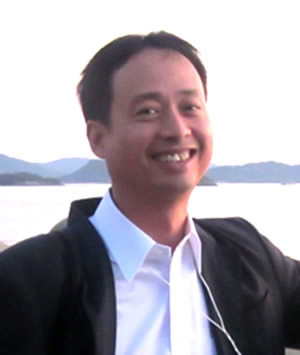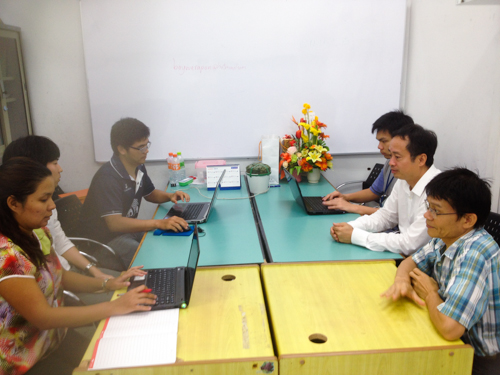June 2014 Issue
Topics
Letter From Alumni
My academic activities in Thailand

Kosin Chamnongthai, professor of Electronic and Telecommunication Engineering Department, Faculty of Engineering, King Mongkut's University of Tehcnology Thonburi, Bangkok, Thailand
I received my bachelor degree from UEC in 1985, and went back to my home town in Thailand after getting my PhD in 1991. Although I had some choices about my working place, I chose King Mongkut's University of Technology, which is located in the south of Bangkok, because I was born in Bangkok, and at the time I tried to find an appropriate working place in Bangkok where I can attend from home. There was no strong tradition and basis of research in the Electrical Engineering Department where I had worked so that I had to start up a research lab namely "Computer Vision Lab" from nothing in the environment that people concentrated on teaching. The Computer Vision Lab has been started from collecting instruments, students, and documents, gradually grown up, and recently seemed to be well known among graduate students in Thailand in the related fields of IT, Electrical Engineering, Electronics, and Computers. The Computer Vision Lab at KMUTT (visionlab.kmutt.ac.th) has produced more than 100 masters and 8 PhDs, and all of them currently play key role in many important institutes in both government and private sectors of Thailand and neighbouring countries.

In addition to my teaching and research duties, around 15 years ago many researchers in electrical and computer engineering fields in Thailand agreed that we should establish an academic association. Hence, the Electronic and Computer Telecommunication and Information (ECTI) association was founded and becomes the first academic association in fields of electrical engineering, electronics, computer, telecommunication, and information technology emerging in Thailand. In the association, I have served as editor of e-magazine, associate editor of international transactions, and main committee for organising many international and national conferences. The ECTI e-magazine is electronically published in every three months, and the No. 1 of Vol. 8 was just published in March 2014 (http://www.ecti-thailand.org/emagazine). For the Transactions, I have been involved as associate editor in both ECTI-EEC Trans (http://www.ecti-thailand.org/paper/journal/ECTI-EEC) and ECTI-CIT Trans (http://www.ecti-thailand.org/paper/journal/ECTI-CIT) since the beginning. For the ECTI-EEC Trans, I have retired two years ago after it was listed in the TCI and Scorpus indices, and I then moved to concentrate on editing ECTI-CIT Trans which will be applied for the indices soon. These transactions become the international stages for researchers, professors, and students from around the world especially Asian countries to publish their advanced research results, and in some cases publishing in the ECTI transactions can be used as a condition for getting a degree.
In hosting conferences, I started to serve as a local arrangement committee in the organizing team of an international conference called APCAS in 1998 held in Chiangmai, Thailand where I first learned how to distribute the papers to reviewers, how to select the papers, how to set up the parallel sessions, and so on. The first organising of international conference inspired me very much to concentrate on conference activities so that I accordingly organized many conferences with my happiness. I had served as general chair, technical program chair and so on for various well-known conferences both in national and international levels such as EECON, ECTI-CON, ECTI-CARD, IWAIT, NICOGRAPH, ISPACS, ITC-CSCC, SICE, ICESIT, SISA, APSIPA, TENCON, ISCIT, iEECON, ICSEC, JCSSE, KST, JICTEE, and so on. Actually, we expect that the conferences organized in Thailand will benefit participation chances for people in Thailand and the ASEAN region. However, I ultimately recognize what I get is not only know-how of organizing conference but also expansion of my human network in the international level.
Recently, since the population of Japan tends to dramatically decrease, the Japanese universities need to scale down their business, and simultaneously recruit students from oversea for filling in the capacity. UEC which is selected as one of the National Research Universities also has to lead in efficient management and expand its internationalization in its education and research in order to deal with the next generation problem of less population. UEC has accordingly started up the research centre in Bangkok called UARC (UEC ASEAN Research Centre) since Feb 7, 2014. This research centre may feature as the hub for collaborations between university and private sectors in ASEAN region, and contribute in education of students in the region. I as an alumni of UEC currently serve as UARC vice director, and will contribute as coordinator to find collaboration partners in ASEAN, and advertise the UEC reputation in ASEAN.


